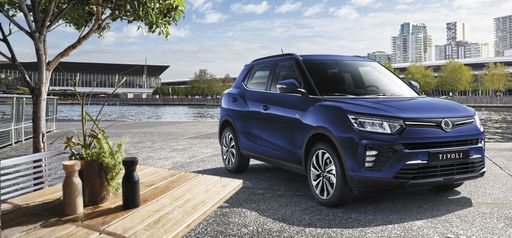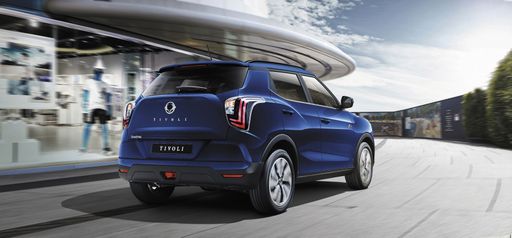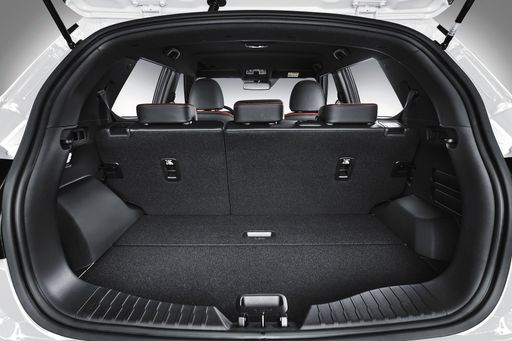SsangYong Tivoli VS Toyota Proace Bus – Specs, Efficiency & Price Comparison
Which model is the better choice – the SsangYong Tivoli or the Toyota Proace Bus? We compare performance (163 HP vs 177 HP), boot capacity (720 L vs 0 L), efficiency (7 L vs 24.20 kWh7.30 L), and of course, the price (21400 £ vs 31600 £).
Find out now which car fits your needs better!
The SsangYong Tivoli (SUV) is powered by a Petrol engine and comes with a Manuel or Automatic transmission. In comparison, the Toyota Proace Bus (Bus) features a Electric or Diesel engine and a Automatic or Manuel gearbox.
When it comes to boot capacity, the SsangYong Tivoli offers 720 L, while the Toyota Proace Bus provides 0 L – depending on what matters most to you. If you’re looking for more power, you’ll need to decide whether the 163 HP of the SsangYong Tivoli or the 177 HP of the Toyota Proace Bus suits your needs better.
There are also differences in efficiency: 7 L vs 24.20 kWh7.30 L. In terms of price, the SsangYong Tivoli starts at 21400 £, while the Toyota Proace Bus is available from 31600 £.
Compare all the key specs now and find out which model fits your lifestyle best!
SsangYong Tivoli
The SsangYong Tivoli is a compact SUV that seamlessly blends style with practicality, making it an appealing choice for urban drivers. Its sleek design is complemented by a well-crafted interior, offering a comfortable and spacious experience for passengers. With its reliable performance and modern features, the Tivoli stands out as a versatile option in the competitive compact SUV market.
details @ Ssangyong
@ Ssangyong
 @ Ssangyong
@ Ssangyong
 @ Ssangyong
@ Ssangyong
Toyota Proace Bus
The Toyota Proace Bus offers a versatile and practical solution for those in need of spacious passenger transport combined with a touch of comfort. Its interior is designed to maximise seating capacity while ensuring that both driver and passengers can enjoy a pleasant journey. With its efficient engine options and reliable build quality, this vehicle remains a popular choice for families and businesses alike.
details

|
|
|
|
|
Costs and Consumption |
|
|---|---|
|
Price
21400 - 30300 £
|
Price
31600 - 61800 £
|
|
Consumption L/100km
7 - 8.3 L
|
Consumption L/100km
7.3 - 7.4 L
|
|
Consumption kWh/100km
-
|
Consumption kWh/100km
24.2 - 24.4 kWh
|
|
Electric Range
-
|
Electric Range
218 - 343 km
|
|
Battery Capacity
-
|
Battery Capacity
-
|
|
co2
161 - 191 g/km
|
co2
0 - 193 g/km
|
|
Fuel tank capacity
50 L
|
Fuel tank capacity
69 L
|
Dimensions and Body |
|
|---|---|
|
Body Type
SUV
|
Body Type
Bus
|
|
Seats
5
|
Seats
5 - 9
|
|
Doors
5
|
Doors
4 - 5
|
|
Curb weight
1375 - 1492 kg
|
Curb weight
1835 - 2140 kg
|
|
Trunk capacity
395 - 720 L
|
Trunk capacity
0 L
|
|
Length
4225 - 4480 mm
|
Length
4983 - 5333 mm
|
|
Width
1810 mm
|
Width
1920 mm
|
|
Height
1613 - 1646 mm
|
Height
1890 mm
|
|
Payload
425 - 455 kg
|
Payload
825 - 1265 kg
|
Engine and Performance |
|
|---|---|
|
Engine Type
Petrol
|
Engine Type
Electric, Diesel
|
|
Transmission
Manuel, Automatic
|
Transmission
Automatic, Manuel
|
|
Transmission Detail
Manual Gearbox, Automatic Gearbox
|
Transmission Detail
Schaltgetriebe, Automatikgetriebe
|
|
Drive Type
Front-Wheel Drive, All-Wheel Drive
|
Drive Type
Front-Wheel Drive
|
|
Power HP
163 HP
|
Power HP
136 - 177 HP
|
|
Acceleration 0-100km/h
-
|
Acceleration 0-100km/h
13.30 s
|
|
Max Speed
175 - 181 km/h
|
Max Speed
130 - 170 km/h
|
|
Torque
260 - 280 Nm
|
Torque
260 - 400 Nm
|
|
Number of Cylinders
4
|
Number of Cylinders
4
|
|
Power kW
120 kW
|
Power kW
100 - 130 kW
|
|
Engine capacity
1497 cm3
|
Engine capacity
1997 cm3
|
General |
|
|---|---|
|
Model Year
2021 - 2024
|
Model Year
2024 - 2025
|
|
CO2 Efficiency Class
F, G
|
CO2 Efficiency Class
A, G
|
|
Brand
SsangYong
|
Brand
Toyota
|
SsangYong Tivoli
Discover the SsangYong Tivoli: A Blend of Comfort and Performance
In the realm of compact SUVs, the SsangYong Tivoli has carved out a niche for itself with its blend of robust performance and luxurious comfort. Catering to a diverse range of drivers, the Tivoli stands as a testament to SsangYong's commitment to innovation, efficiency, and style. This article dives into the technical brilliance and innovations that make the Tivoli a standout choice in its segment.
Performance Unleashed: Under the Bonnet of the Tivoli
The SsangYong Tivoli does not shy away from showcasing its engineering prowess. With a powerful 1.5 GDI-T petrol engine under its bonnet, the Tivoli offers a thrilling 163 PS (120 kW), ensuring a spirited drive. This engine is paired with either a manual or automatic transmission, providing drivers with options to match their driving preferences.
The Tivoli's performance metrics are equally impressive, boasting a torque range between 260 and 280 Nm. These figures translate to a responsive and dynamic driving experience, whether you're navigating city streets or cruising on highways. Top speeds range from 175 to 181 km/h, underscoring the Tivoli's versatility as a daily driver with an adventurous side.
Efficient on the Roads: Fuel Economy and CO2 Emissions
Efficiency is a hallmark of the Tivoli, with fuel consumption figures ranging between 7 and 8.3 L/100km, depending on the chosen configuration. It's not just about performance; the Tivoli strikes a balance by ensuring environmental considerations are met, with CO2 emissions between 161 and 191 g/km, placing it in the CO2 efficiency classes of F and G.
Innovative and Spacious Design
Designed with the modern driver in mind, the Tivoli combines functionality with style. Its exterior dimensions—spanning a length of 4225 to 4480 mm—create a commanding presence on the road, while its height of 1613 to 1646 mm and width of 1810 mm suggest ample interior space. With a boot space offering 395 to 720 litres, the Tivoli caters to both urban living and adventurous getaways.
Comfort Meets Technology: Inside the Tivoli
The interior of the Tivoli is a reflection of SsangYong's dedication to comfort and technology. Accommodating up to five passengers, the Tivoli ensures every ride is a comfortable journey with advanced features and materials. The availability of various trim levels, such as the Amber, Blackline, and Quartz, allows for personalisation, meeting the specific needs and desires of each driver.
The Tivoli's Commitment to Safety
Safety remains a priority for SsangYong, and the Tivoli is no exception. Equipped with a range of safety features, including a reinforced body structure, multiple airbags, and advanced driver assistance systems, the Tivoli ensures peace of mind for all occupants.
Conclusion
The SsangYong Tivoli is more than just a compact SUV; it is a symbol of outstanding engineering fused with everyday practicality. Whether it's the daily commute or a weekend getaway, the Tivoli is equipped to handle a variety of driving scenarios with style and efficiency. For those seeking a vehicle that combines reliability with cutting-edge technology, the Tivoli stands as a noteworthy contender in the SUV market.
Toyota Proace Bus
The Versatile Companion: Toyota Proace Bus
The Toyota Proace Bus stands out in the competitive MPV segment, offering a blend of practicality, efficiency, and innovative technology. Toyota has crafted this vehicle to cater to a wide array of needs, whether it be family outings, business transport, or electric motoring. Let's delve into the technical details and innovations that make the Toyota Proace Bus a compelling choice.
Engineering Excellence: Diesel and Electric Variants
The Proace Bus provides several powertrain options to meet diverse requirements. Customers can choose between robust diesel engines or an innovative electric drive system. Diesel variants feature a 2.0 D-4D engine available in various outputs, from 144 PS to 177 PS, supporting both manual and automatic gear options. The diesel engines deliver a balanced performance, with fuel consumption ranging between 7.3 to 7.4 L/100km.
On the electric front, the Proace Electric offers an enticing prospect for eco-conscious drivers. Equipped with a battery capacity of up to 75 kWh, this variant ensures a respectable range of up to 343 km on a single charge, while consuming between 24.2 to 24.4 kWh/100 km. The electric model delivers 136 PS, making it ideal for smooth urban driving.
Interior Innovation: Comfort Meets Functionality
The Toyota Proace Bus impresses with its versatile interior, accommodating 5 to 9 passengers comfortably. Various seating configurations are available depending on the version and needs, making it a perfect solution for both large families and shuttle services. Modern technology adorns the cabin, with a focus on comfort and connectivity, ensuring all passengers travel in style and enjoy seamless connectivity options.
Safety Features and Driver Assistance Technologies
Safety is paramount in the Proace Bus, featuring a plethora of driver assistance systems designed to protect both passengers and pedestrians. Advanced features include parking assistance, lane departure warning, and adaptive cruise control, providing peace of mind during long journeys.
Efficiency and Environmental Considerations
Balancing performance with environmental responsibility, the Proace Bus range includes models that meet various CO2 efficiency classes from A to G. The electric variant notably achieves zero CO2 emissions, making it an excellent choice for sustainable mobility. Furthermore, innovations in aerodynamics and weight management contribute to the Proace Bus's commendable efficiency metrics.
Conclusion: A Dynamic Choice for Modern Needs
The Toyota Proace Bus exemplifies Toyota's commitment to versatility, efficiency, and innovation. With its broad range of engine options, seating configurations, and state-of-the-art technologies, it serves multiple purposes while keeping operational costs in check. Whether for family, business, or eco-friendly motoring, the Proace Bus is a formidable contender in today's automotive landscape.
The prices and data displayed are estimates based on German list prices and may vary by country. This information is not legally binding.
